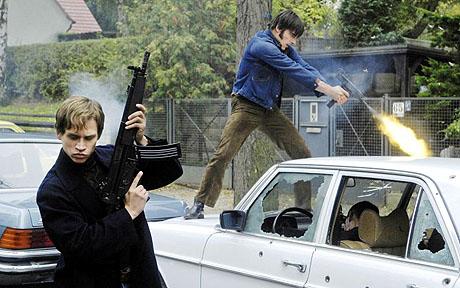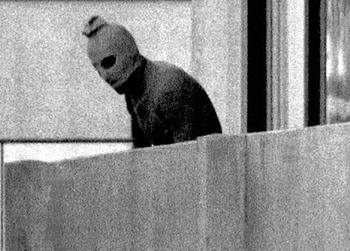Movies about Terrorism – Films with Terrorists
The definition of terrorism is wide ranging, with one study finding more than 100 different interpretations around the globe. In most cases, however, it refers to violent acts designed to advance a specific political, religious, or ideological goal.
Movies about terrorism are equally murky, with thinly-veiled pieces of propaganda often listed alongside more thoughtful (and realistic) works of cinema. While both have a certain merit to educators and those curious about global affairs, placing them into distinct categories can often prove difficult. That’s because “terrorism” is a polarizing word, one that is often greeted with knee-jerk reactions of fear and hatred.
In this article, it’s my intention to present a wide-ranging list of films with terrorists. Some deal with attacks on American soil, while others depict nations who’ve been struggling with the issue for decades prior to September 11th, 2001. In either case, a brief description of the film will be given, and each listing will also include a link to an educational resource for additional study.
The Battle of Algiers (1966) – No film better illustrates the causes and consequences of terrorism than this Algerian/Italian co-production directed by Gillo Pontecorvo. Set during the Algerian War of Independence from 1954 to 1960, the film pits French paratroopers against the National Liberation Front, a revolutionary group looking to end French rule in Algeria. Shot in black-and-white and made to look like a documentary, The Battle of Algiers presents an even-handed account of both sides, and it has since been praised by everyone from the Pentagon to various insurgent groups. The cast of non-professional actors lend a realness to events, and the Ennio Morricone score manages to ratchet the tension to a fever pitch.
The Kingdom (2007) – When a number of Americans are killed by bomb blasts in Saudi Arabia, a team of FBI specialists (including Jamie Foxx, Jennifer Garner, Jason Bateman, and Chris Cooper) are sent to observe the Saudi investigation. The observer status doesn’t last long, though, and soon the film’s heroes are knee-deep in suicide bombers and gun-wielding extremists. One critic referred to the film as “xenophobic,” and it was roundly criticized in the Middle East. It is, however, a well-paced film that adequately demonstrates the simplistic views of Hollywood when it comes to terrorism.
The Baader Meinhof Complex (2008) – A powderkeg of a film, this German-made project from director Uli Edel documents the rise and fall of the Red Army Faction, a notorious band of revolutionaries and terrorists active during the ’60s and ’70s. Martina Gedeck (Ulrike Meinhof) and Moritz Bleibtreu (Andreas Baader) deliver powerful performances, whether they’re firing off automatic weapons in the middle of a city or engaging in a hunger strike behind bars. While the RAF’s motivations could have been explained in more depth, The Baader Meinhof Complex marks a well-crafted starting point for those eager to learn about one of Europe’s most feared terrorist organizations.
Rendition (2007) – “Extraordinary rendition” takes place when a nation that condemns torture takes someone prisoner and then illegally transports them to a country where such practices are still common. Since the beginning of the century, the CIA is believed to have performed extraordinary rendition on several thousand people. Based on a true story, Rendition involves a law-abiding citizen who’s mistaken for a suspected terrorist and subject to all manner of brutality. Starring Jake Gyllenhaal, Meryl Streep, and Reese Witherspoon, the movie offers a frank discussion of when (if ever) torture is justified, and who should take ultimate responsibility for such actions.
Body of Lies (2008) – Most Hollywood movies about terrorism are somewhat outlandish, but this Ridley Scott film takes an in-depth look at the politics of counter-terrorism through the eyes of CIA operative Roger Ferris (Leonardo DiCaprio). As he searches for a jihadist leader hiding in Jordan, Ferris must cultivate a relationship with the head of Jordanian intelligence (the scene-stealing Mark Strong) and stay one step ahead of his callous supervisor (Russell Crowe). The conflict between Arab and Western cultures is demonstrated throughout, especially when Ferris begins a romance with a local nurse (Golshifteh Farahani). While the film does suffer from Hollywood Screenwriting 101 at times, it remains a fast-paced and well-acted introduction to the challenges faced when combating terrorists around the globe.
The Terrorist (1999) – Drawn from real-life events, this Kollywood film revolves around a 19-year-old woman (Ayesha Dharkar) who undertakes a mission to kill a politician via suicide bombing. But once she arrives at her destination, a series of events shake her resolve and cast doubt on using violence to achieve an objective. While it was shot on a low budget, this intimate look at terrorism and those involved drew critical praise (including being added to Roger Ebert’s list of great movies) and brought greater attention to the motivations of female suicide bombers.
Right at Your Door (2006) – The fear and paranoia generated by terrorism can be as crippling as an actual attack, and that’s the premise of this thriller starring Rory Cochrane and Mary McCormack. When dirty bombs are detonated in downtown L.A., a frantic husband (Cochrane) sets about sealing up his house with duct tape to prevent outside contamination, but his obsession with personal safety is challenged when his ash-covered wife (McCormack) returns home and demands to be let inside.
United Red Army (2007) – Japanese director Koji Wakamatsu made a number of personal sacrifices to get this film made, including mortgaging his home and later blowing it up on-camera. It paid off, though, as his project paints a tragic and unflinching portrait of the United Red Army, a violent revolutionary group who retreated to the Japanese Alps in 1971 for “self-criticism” training and slowly turned on itself. The cult of personality maintained by the revolutionary leaders is fascinating to observe, especially when they begin killing off followers for violations such as improper gun care and wearing make-up.
Michael Collins (1996) – Liam Neeson stars as Michael Collins, a key figure in the formation of the modern Irish state. The inner politics of the IRA and various other factions are explored, and anyone not familiar with the complexities of the conflict between Britain and Ireland are urged to start here (perhaps watching it back-to-back with The Wind That Shakes the Barley). Directed by Neil Jordan, the film co-stars Julia Roberts, Alan Rickman, Aidan Quinn, and Stephen Rea.
Beyond Belief (2007) – Both uplifting and heartbreaking, this Beth Murphy documentary follows Patti Quigley and Susan Retik, two 9/11 widows who set up a program to help Afghan women who’ve lost their husbands to war and poverty. A powerful tale of two individuals who have refused to become victims or succumb to blind hatred.
Day Night Day Night (2006) – A somber look at the final hours in the life of a young woman (Luisa Williams) who’s determined to detonate a bomb in the center of Times Square. Her specific political ideology isn’t examined, rather the film digs beneath the surface to show a human being who’s reached a dark place unimaginable to most. The film’s ponderous nature may be too slow for some, but it never takes sides and provides an excellent platform for a post-viewing discussion on the psychology of a suicide bomber.
Anwar (2007) – After being needlessly detained for five hours by police in post-9/11 New York, director Manish Jha decided to take his experience and turn it into something productive. The result was Anwar, a Hindi film about a Indian researcher who takes refuge in a temple to clear his head and is suspected of being a terrorist. Surrounded by police, media, and curious onlookers, Anwar (Siddharth Koirala) must decide on his next move. An insightful exploration of how Muslims are stereotyped, even in countries outside of America.
One Day in September (1999) – Winner of the Academy Award for Best Documentary Feature, this Kevin Macdonald film details the terrorist attack by a Palestinian group known as Black September on the 1972 Summer Olympics in Munich, Germany. Members of the Israeli Olympic team were taken hostage, and eleven athletes and coaches were dead by the end of the standoff. Includes copious footage from the actual event, as well as modern-day interviews with everyone from German military leaders to the former director of the Mossad. A chilling look at a terrorist event unfolding step-by-step and rushing headlong towards disaster.
Shiri (1999) – A South Korean blockbuster about North Korean agents who infiltrate their neighbors to the south and plan on launching a terrorist attack during a soccer match. Meanwhile, South Korean lawmen are busy trying to track down a female assassin who’s been living among them for years and picking off key members of the government. The issue of Korean reunification is addressed in no uncertain terms, and the film’s slick look and action-packed plot is directly patterned after big-budget Hollywood projects. While not based on any actual event, it should prove engaging enough to get viewers interested in the divide between North and South Korea and the issues preventing a peaceful merger.
Land of Plenty (2004) – After the events of 9/11, many Arab-Americans have found themselves on the receiving end of suspicion, often by their fellow citizens. This Wim Wenders drama examines such sentiment, often through the eyes of a paranoid Vietnam veteran named Paul (John Diehl) who spends much of his time keeping tabs on anyone who looks Muslim. His attitude is counterbalanced by that of his niece (Michelle Williams), a worldly young woman who sees little difference between people of various religions and skin tones.
The Assignment (1997) – While terrorism often seems to be a faceless act, Carlos the Jackal was a real-life terrorist both known and feared for decades. This spy thriller takes a fictional look at the CIA’s efforts to catch him, as they recruit a look-alike from the ranks of the U.S. Navy (Aidan Quinn) and train him to impersonate Carlos down to the last detail. Donald Sutherland co-stars as a CIA operative, and Ben Kingsley is predictably wonderful as a non-nonsense Mossad agent. The film may play fast and loose with the facts, but it’s an action-packed and entertaining way to get students interested in the personalities within the global terrorist community.
Black Friday (2004) – After the tragic events of the 1993 Bombay Riots (in which over 1,500 people died), a series of explosions ripped across the city now known as Mumbai and left 257 dead and 1,400 injured. This Indian film from director Anurag Kashyap attempts to recreate the events leading up to the events of Black Friday, as well as showing the aftermath. Based on the S. Hussain Zaidi book, Black Friday – The True Story of the Bombay Bomb Blasts. An excellent film for educators who want to teach their students about acts of terrorism not centered around the Middle East.
This entry was posted on Friday, June 3rd, 2011 at 7:44 am and is filed under Good Movies. You can follow any responses to this entry through the RSS 2.0 feed. You can leave a response, or trackback from your own site.
2 Responses to “Movies about Terrorism – Films with Terrorists”
Great list.. lot of very good recommendations.. good job..



Tucker Muncie
I found Land of Plenty haunting. I’ll take your advice and watch Shiri. I can’t make heads nor tails of that Korean situation, but as a devoted Texan, I’m sure Charles Krauthammer is right.